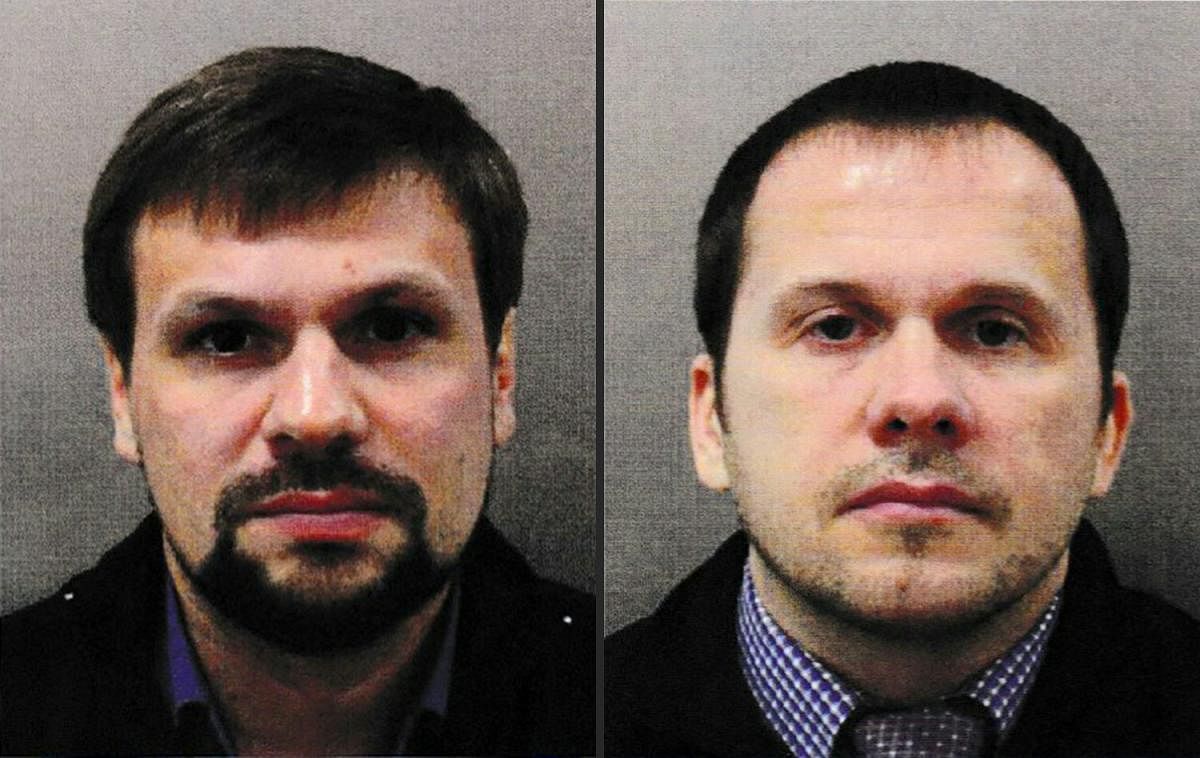
British Prime Minister Theresa May said on Wednesday that two Russian military intelligence officials carried out a nerve agent attack on a former spy on British soil, as prosecutors issued a warrant for the suspects' arrest.
Police identified Alexander Petrov and Ruslan Boshirov as the men who allegedly tried to kill Russian former double agent Sergei Skripal and his daughter Yulia with Novichok in the city of Salisbury in March.
Theresa told MPs the pair "are officers of the Russian military intelligence service, also known as the GRU" -- adding the attack had been sanctioned from higher up.
"The GRU is a highly-disciplined organisation with a well-established chain of command. So this was not a rogue operation," she told parliament.
"It was almost certainly also approved outside the GRU at a senior level of the Russian state."
London and its allies had previously blamed Moscow for the attack, which Russia angrily denied, sparking a wave of diplomatic expulsions on both sides, as well as fresh US sanctions.
A spokeswoman for the Russian foreign ministry said on Wednesday it had no knowledge of Petrov or Boshirov and accused London of "manipulating information".
"We once again call on the British side to switch from public accusations and manipulating information to practical cooperation through law enforcement agencies," Russian news agencies quoted spokeswoman Maria Zakharova as saying.
Britain's Crown Prosecution Service (CPS) said it would not apply for Petrov and Boshirov to be extradited, as Russia has made clear in previous cases that it did not extradite its nationals.
In 2007, Russia refused to extradite Andrei Lugovoi, the prime suspect in the murder by radioactive poisoning of former Russian agent Alexander Litvinenko in London.
"We have, however, obtained a European arrest warrant (EAW)," said CPS director of legal services, Sue Hemming.
"(This) means that if either man travels to a country where an EAW is valid, they will be arrested and face extradition on these charges for which there is no statute of limitations," which means the charges never expire.
Assistant Commissioner Neil Basu of London's Metropolitan Police -- Britain's top counter-terrorism officer -- said the two suspects were believed to be in their 40s.
"It is likely that they were travelling under aliases and that these are not their real names," he said.
Basu said photos of the men and CCTV of their movements were being made public in the hope that a member of the public will recognise them.
He said the pair flew into London's Gatwick Airport from Moscow on March 2 and stayed at a hotel in the east of the capital -- where traces of Novichok were found in their room.
On Saturday they paid a day-trip to Salisbury, a sleepy city in the southwest of England, to carry out reconnaissance.
They returned the following day, when they smeared Novichok, a military-grade nerve agent developed by the Soviet Union during the Cold War, on Skripal's front door.
A few hours later, Skripal and his daughter, who was visiting from Moscow, were found unconscious on a park bench in the city.
The two men that evening flew back to Moscow from London's Heathrow airport.
The CPS said Petrov and Boshirov face charges of conspiracy to murder the ex-spy, and the attempted murder of Skripal, his daughter, and Nick Bailey, a policeman injured in the attack.
They are also accused of using a banned chemical weapon and causing grievous bodily harm to Yulia Skripal and Bailey.
Skripal was a colonel in Russian military intelligence who was jailed for betraying agents to Britain's MI6 security service. He moved to England in 2010 as part of a spy swap.
The Skripals and Bailey both recovered from their poisoning.
But on June 30, a British couple fell ill from the same type of nerve agent in the nearby town of Amesbury. One of them, 44-year-old mother of three Dawn Sturgess, died on July 8. Her partner Charlie Rowley had found and given to her a perfume bottle, falsely labelled as "Premier Jour" by Nina Ricci, which police said contained a "significant amount of Novichok".
Rowley was also hospitalised and although he was discharged, recently returned and is being treated for meningitis and loss of eyesight.
The Organisation for the Prohibition of Chemical Weapons (OPCW) on Tuesday confirmed he and Sturgess were poisoned by Novichok.
Basu said the British pair were not targeted but fell ill "as a result of the recklessness in which such a toxic nerve agent was disposed of".